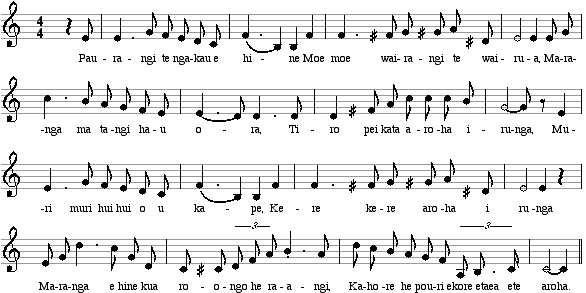|
Paurangi te ngakau e hine Moemoe wairangi te wairua, Maranga ma tangi hau ora Tiro pei kata aroha irunga Muri muri hui hui o u kape, Kere kere aroha i runga Maranga e hine kua rongo he rangi Kahore he pouri e kore e taea e te aroha. |
Beneath
a tree, stricken with love, I crept Weary and lost, alone I slept Rising in hidden sweetest murmurs Gentle breezes peep and smile Softer than silence o'er my brow they played Wafting love's incense to my soul Calling "Awake fond one, the heavens are glowing There is no darkness love cannot light." |

Listen to Ana Hato singing this song in 1927 Ana Hato
Listen to Kiri singing the final four lines on this 148 K MP3 sample.This Kiri MP3 is highly compressed. The original, on her CD, "Kiri: Maori Songs", sounds even better.
Kiri: Maori Songs CD
This CD was recorded to mark Kiri Te Kanawa's 50th birthday at the Royal Albert Hall, London in 1995. It is is uniquely beautiful, combining traditional folk rhythms and vocal arrangements with contemporary European-derived melodies.
The songs were mostly written by Maori composers in the early years of the 20th century. They combine melodies from the European popular music tradition with Maori vocal and instrumental stylings that sound like no other music on earth. Male and female voices sing different vocal lines, in unison or in sequence, sometimes in contrasting moods.
It is unabashedly sentimental. 1920s Maori love song lyrics, and Edwardian "parlour piano" melodies have been arranged and sung here with opera-style lushness. The songs are sung with one verse repeated several times, and so the stories in the other verses are lost, and thus the CD lacks the full strength of Maori sensibility. But it is beautiful to listen to. And it has attracted hundreds of people to this web site of mine, so they can learn more about our Maori songs.
Mihi nui to Kiri, Max, Hinemoana and all the rest of you fullas in the recording team.
I have lyrics, translations and information to many of Kiri's tracks:
- Hine E Hine
- The Locust
- Moe Mai E Hine Lyrics and translation only
- Hoea Ra
- Matangi
- Huri Huri
- E Papa Waiari
- Ara Ka Titiro
- Hoki Hoki
- Now Is The Hour
- Piki Mai
- Haere Ra E Hine
- E Pari Ra
- Akoako E Te Rangi - you are here already!
- Tahi Nei Taro Kino
- Pokarekare Ana
Emira Maewa Kaihau
(b.1879 - d.19??) Maewa Kaihau was born Louisa Flavell at Whangaroa, in Northland. She is said to have descended from French nobles fleeing the French Revolution, and a musician from the court of the Austrian Emperor.
On her mother's side she was a direct descendant of Nga Puhi chief Hone Hika of Ngati Rahiri and Ngati Rehia Hapü.
Maewa married Henare Kaihau, the Maori Member of Parliament representing Western Maori until 1920. Maewa was musically gifted and she played the piano and sang. She was also well known for her reading of poetry. She wrote Akoako o te Rangi in 1918.
In 1920 Maewa wrote Haere Ra Waltz song. She set her words to Po Atarau, an old and favourite song from the Ratana church hymn book. Over the next ten years the song became a wharfside farewell favourite for passenger ships, and eventually gained worldwide popularity as Now is the Hour.
There is little information about how Maewa lived out the rest of her life, or where and when she died.
Publishing history of Akoako o te Rangi
1918 - The original piano score was published by A. Eady & Co Auckland.This score was reprinted in the glossy book Famous Maori Songs in about 1940. A copy of this book is held at the Wanganui District Library. I have a photocopy of the Akoako score from ths book. The music was originally written in the key of D flat. I lowered it to the key of C for the transcript on this web page.c.1927 - 78 rpm recording by Ana Hato. Parlophone
c.1940 - Famous Maori songs. Piano scores, published by Begg
c.1963 - LP Parlophone
1995 - CD Ana Hato classic songs, remastered with and Deane Waretini. Kiwi Pacific
1992 - CD Maui's farewell re-release of songs by the late Inia Te Wiata
1995 - CD Kiri: Maori Songs.